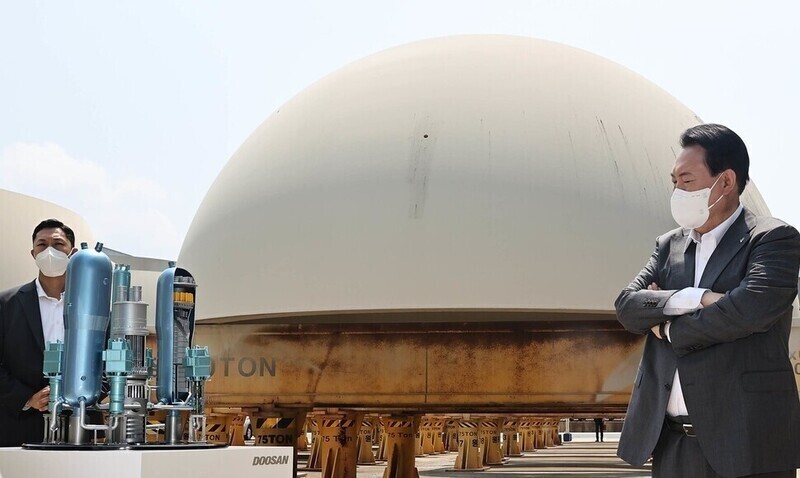hankyoreh
Links to other country sites 다른 나라 사이트 링크
[Column] Climate change and energy transition: Nuclear is not the answer


By Timo Fleckenstein, associate professor of social policy at the London School of Econom-ics
Whilst Seoul experienced unprecedented rainfall this summer, the United Kingdom suffered from record temperatures, reaching 40 degrees Celsius (104 F) for the first time. Extreme heat combined with little rainfall — in a country that is widely associated with rain — has caused drought in some parts of the land. Turning to the European mainland, low water levels in major rivers comprise critical European shipping routes, for instance; and wildfires are getting bigger and bigger. The “fire season” starts now earlier and finishes later, putting much pressure on emergency services.
Not only do these weather extremes cause the loss of precious lives, they also cause tremendous economic damage and ultimately social hardship. The floods in Seoul as well as the heat and droughts in Europe point to poor readiness to deal with the consequences of climate change. Research at the London School of Economics suggests that climate change causes the UK economic damage of 1.1% of GDP, and this is projected to rise to 3.3% by 2050 and 7.4% by 2100.
Climate change and the energy crisis due to the war in Ukraine provide powerful evidence for the flaws of the continued dependence on fossil fuels. In the UK, the typical energy bill is going up to 3,549 pounds per year (about US$4,110); at the beginning of the year, it was not much more than a third of this. If this was not bad enough, projections suggest that the typical bill might reach 6,000 pounds. Increases in energy prices for industry are even worse.
There cannot be any doubt: We need to urgently turn away from the fossil fuels of the past and expand renewable energy sources at unseen scale and speed, in addition to using energy more efficiently. When the Conservatives in the UK floated the idea of suspending green levies to reduce energy bills, business leaders voiced concerns, as the funds from these levies are critical for decarbonizing the economy. Apparently, business — not typically at the front of any environmental movement — recognizes the imperative of decarbonization.
But do the dangers of climate change justify the revival of nuclear energy? Certainly not! Suggestions that nuclear energy is carbon-free and thus climate-friendly are misleading: Whilst there is much controversy over its full carbon footprint, nuclear energy cannot compete with the green credentials of solar and wind energy, and renewable energy is cheaper too. Also, we should not forget the great risks involved in nuclear energy: the Fukushima nuclear disaster, for instance; and the current risks around the besieged Ukrainian nuclear plant send shockwaves through Europe.
Nuclear energy will not save the climate. President Yoon’s support for it is short-sighted at best.
Nuclear energy is not an “engine of growth”; it is a cul-de-sac. I can understand that he is keen on any headline that deflects temporarily from the incompetency he has so far displayed in office. However, instead of celebrating a rare export of nuclear power technology, the government should work on a meaningful strategy, not only for the decarbonization of the Korean economy, but also for the promotion of green industries for economic prosperity and high-quality jobs.
Certainly, the scrapping of the phasing out of nuclear energy — a policy of the previous Moon Jae-in government — is the wrong signal for both the climate and the economy. I admit there is little hope that the imperative sustainability will be recognized by Yoon and his conservative party, and I fear Korea will lose valuable time. All the more important is it that progressive forces make every effort to promote an alternative, future-oriented growth model that puts sustainability and social justice center stage: set the agenda in the National Assembly and beyond, expose the government, and be ready to shift the paradigm when their time comes.
Please direct questions or comments to [english@hani.co.kr]

Editorial・opinion
![[Column] Season 2 of special prosecutor probe may be coming to Korea soon [Column] Season 2 of special prosecutor probe may be coming to Korea soon](https://flexible.img.hani.co.kr/flexible/normal/500/300/imgdb/original/2024/0426/3317141030699447.jpg) [Column] Season 2 of special prosecutor probe may be coming to Korea soon
[Column] Season 2 of special prosecutor probe may be coming to Korea soon![[Column] Park Geun-hye déjà vu in Yoon Suk-yeol [Column] Park Geun-hye déjà vu in Yoon Suk-yeol](https://flexible.img.hani.co.kr/flexible/normal/500/300/imgdb/original/2024/0424/651713945113788.jpg) [Column] Park Geun-hye déjà vu in Yoon Suk-yeol
[Column] Park Geun-hye déjà vu in Yoon Suk-yeol- [Editorial] New weight of N. Korea’s nuclear threats makes dialogue all the more urgent
- [Guest essay] The real reason Korea’s new right wants to dub Rhee a founding father
- [Column] ‘Choson’: Is it time we start referring to N. Korea in its own terms?
- [Editorial] Japan’s rewriting of history with Korea has gone too far
- [Column] The president’s questionable capacity for dialogue
- [Column] Are chaebol firms just pizza pies for families to divvy up as they please?
- [Column] Has Korea, too, crossed the Rubicon on China?
- [Correspondent’s column] In Japan’s alliance with US, echoes of its past alliances with UK
Most viewed articles
- 1[Column] Season 2 of special prosecutor probe may be coming to Korea soon
- 2‘We must say no’: Seoul defense chief on Korean, USFK involvement in hypothetical Taiwan crisis
- 3Is N. Korea threatening to test nukes in response to possible new US-led sanctions body?
- 4Division commander ordered troops to enter raging flood waters before Marine died, survivor says
- 5Is Japan about to snatch control of Line messenger from Korea’s Naver?
- 6No good, very bad game for Korea puts it out of Olympics for first time since 1988
- 7[Editorial] Korea’s surprise Q1 growth requires objective assessment, not blind fanfare
- 8Korea’s 1.3% growth in Q1 signals ‘textbook’ return to growth, says government
- 9N. Korean delegation’s trip to Iran shows how Pyongyang is leveraging ties with Moscow
- 10Amnesty notes ‘erosion’ of freedom of expression in Korea in annual human rights report